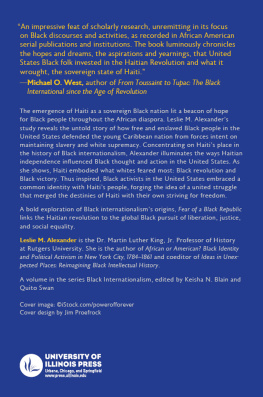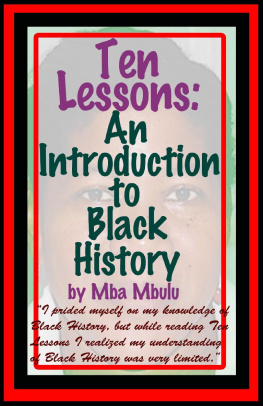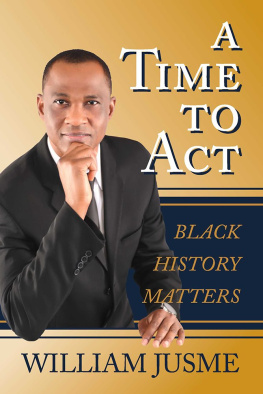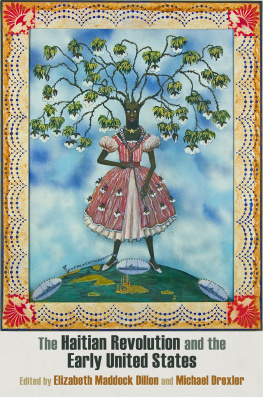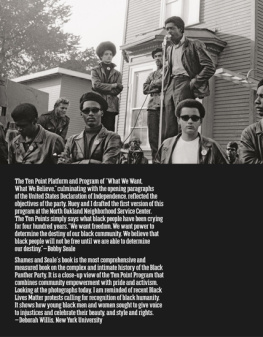Contents
List of Figures
Page List
Guide

An illustration of the coat of arms on the Haiti flag is on the cover. The coat of arms has several weapons on a green hill. A royal palm tree is in the middle. A drum and two trumpets are in front of the palm, and several spears and flags are behind the palm.
fear of a black republic
BLACK INTERNATIONALISM
Edited by Keisha N. Blain and Quito Swan
This series grapples with the international dimensions of the Black freedom struggle and the diverse ways people of African descent articulated global visions of freedom and forged transnational collaborations.
A list of books in this series appears at the end of this book.

fear of a black republic
Haiti and the Birth of Black Internationalism in the United States
leslie m. alexander

2023 by the Board of Trustees of the University of Illinois
All rights reserved
Library of Congress Cataloging-in-Publication Data
Names: Alexander, Leslie M., author.
Title: Fear of a Black republic: Haiti and the birth of Black internationalism in the United States / Leslie M. Alexander.
Other titles: Haiti and the birth of Black internationalism in the United States
Description: Champaign, IL: University of Illinois Press, [2023] | Series: Black internationalism | Includes bibliographical references and index.
Identifiers: lccn 2022018671 (print) | lccn 2022018672 (ebook) | isbn 9780252044816 (hardback) | isbn 9780252086908 (paperback) | isbn 9780252053863 (ebook)
Subjects: lcsh : Black nationalismUnited States History19th century. | African Americans Political activityHistory19th century. | HaitiHistoryRevolution, 17911804 Influence. | African AmericansRelations with Haitians. | United StatesRelationsHaiti. | HaitiRelationsUnited States. | United StatesRace relationsHistory19th century. | HaitiEmigration and immigrationHistory 19th century. | United StatesEmigration and immigrationHistory19th century. | Haiti Politics and government1804
Classification: lcc E185.18.A43 2023 (print) | lcc E185.18 (ebook) | ddc 320.54/6097309034dc23/ eng/20220525
LC record available at https://lccn.loc.gov/2022018671
LC ebook record available at https://lccn.loc.gov/2022018672
Dedicated to my mother, Sandra M. Alexander, who literally danced with me through every chapter of this book.
contents
acknowledgments
There are so many people to thank. So many people who helped me on this journey, and without whom this book would not be possible. When I reflect on all the people who have touched my life, those who have brought laughter, joy, and political insight, I am humbled and grateful.
First, last, and always, I give thanks to the Creator and the ancestors, through whom all things are possible.
My deepest love and gratitude go to my family, who have always supported and encouraged me in every moment of my life. My mother, Sandy Alexander, instilled me with a passion for reading and learning at a very early age. She is still the first person to read drafts of my work, and she is also the one who brings laughter into my home each day. She never tires of listening to me share my work, and she happily celebrates every success I experience. I will never have adequate words to express how grateful I am to experience her love and to be her daughter. I love her absolutely infinity.
My father, John Alexander, departed this earthly realm more than twenty-five years ago, but he is still with me every moment. He is the one who taught me to be a dreamer, and to always strive toward the creation of a better, more just and harmonious society. His vision and his memory sustain me in the most difficult times.
My sister, Michelle Alexander, is best known in the outside world for her passionate commitment to ending mass incarceration. Her brilliant scholarship and her tireless dedication have truly changed the world. But it is her love and sisterhood that have most profoundly shaped and transformed my life. I could not have wished foror imagineda better, more playful, or more loving sister. She is still the one who makes me laugh until my sides ache, and I love her more than words can say.
My niblings, Nicole Stewart, Jono Stewart, and Cori Stewart, are my reason for being. They light up my life with laughter and joy every single day, and I would be satisfied to be nothing more than their Tee Tee. I am so lucky to have their love and to be able to share mine with them. And then, of course, there is Riley Alexander, who brings unconditional love into my life every moment.
My brother-in-law, Carter Stewart, and his parents, Isabel and the late Donald Stewart, have always supported me and my work, for which I am deeply grateful. I especially thank them for the use of Windsor Cottage, their family home in Nantucket. would not have been possible without their generosity.
Deep thanks to Curtis Austin, who always believed in this project, and in me, even when I did not. And to my cousins, Gail Maize, Chrisoula Drivas, and Nicole Drivas, for their love and support.
My political and intellectual life was most profoundly shaped by the time I spent at the Africana Studies and Research Center at Cornell University during my graduate career. Margaret Washington, my dissertation advisor, is the first person who taught me how to conduct historical research and how to approach history with love, care, and diligence. I first met Margaret when I was only a sophomore in collegea young woman who had never imagined herself as a scholar or a historian. I was selected to be her summer research assistant just when she was embarking upon what would become her definitive and award-winning research on Sojourner Truth. Her passion for research and African American history was infectious. We spent hours combing through Cornells massive Antislavery Collection, and we followed the abolitionist trail throughout upstate New York, visiting many archives along the way. Our journeys were always coupled with thoughtful conversations that helped me discover my own voice as a budding scholar, and our experience during that summer blossomed into an academic relationship and personal friendship that has spanned decades. Through her example, I became what she often calls a demon researcher a passionate scholar driven by the exhilarating chase of living history. By far, the most memorable experience that summer was a field trip we took to the ruins of abolitionist Gerrit Smiths house in Peterboro, New York. Together, we dug through the rubble and, as we walked through the remains of his former home, we collected shards of pottery and other remnants, while discussing the courageous people who had walked through that same space more than 100 years before. That trip taught me that history was aliveliving, breathing, and everywhere around me. I still have those pieces of pottery we found. They sit on one of the many bookshelves in my office, and they are probably unremarkable to the people who pass through my office each day. But every time I see them, I smile to myself because I know what they represent. Much more than sentimental memorabilia, they are the embodiment of the power of research and mentorship. Margaret Washington is a passionately committed researcher and scholar, and the proudest achievement in my academic career was to earn a PhD under her watchful eye. I not only emerged a better historian, I also became a better person. Today, I am honored to have her as both a mentor and a cherished friend.

